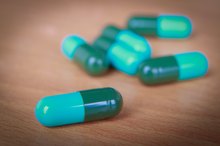What does fact checked mean?
At Healthfully, we strive to deliver objective content that is accurate and up-to-date. Our team periodically reviews articles in order to ensure content quality. The sources cited below consist of evidence from peer-reviewed journals, prominent medical organizations, academic associations, and government data.
The information contained on this site is for informational purposes only, and should not be used as a substitute for the advice of a professional health care provider. Please check with the appropriate physician regarding health questions and concerns. Although we strive to deliver accurate and up-to-date information, no guarantee to that effect is made.
Can You Take Glucosamine & Aspirin?
Glucosamine is a dietary supplement that may help relieve the pain of arthritis. Aspirin, available as both a prescription and an over-the-counter drug, serves as a pain reliever and anti-inflammatory for a variety of ailments. Although they differ in their mode of action in your body, they share a common characteristic that may make them unsuitable to take at the same time. Seek the advice of your health care provider before you add any supplements to your diet or take them in combination with any drug.
If you are experiencing serious medical symptoms, seek emergency treatment immediately.
Glucosamine
Glucosamine is a small molecule that serves as a building block of large molecules called glycosaminoglycans 2. Several types of glycosaminoglycans exist in your body, including hyaluronic acid, chondroitin sulfate and heparin 2. Glucosamine is an integral part of heparin. Heparin functions as an anticoagulant, or blood-thinning agent, by inhibiting the cascade of molecules necessary for clot formation within your blood vessels. The mast cells of your body produce heparin, and it is also available as an injectable drug for treating blood-clotting disorders. Because glucosamine is chemically similar to heparin, taking glucosamine with an anticoagulant may be unsafe.
- Glucosamine is a small molecule that serves as a building block of large molecules called glycosaminoglycans 2.
- The mast cells of your body produce heparin, and it is also available as an injectable drug for treating blood-clotting disorders.
Aspirin
Plavix & Fish Oil
Learn More
Aspirin, or salicylic acid, works to relieve pain, reduce inflammation, lower fever and thin your blood. As a blood thinner, aspirin prevents the platelets in your blood from attaching to each other to form a clot. While clot formation is a normal and often vital response to tissue injury, abnormal clot formation in your blood vessels may lead to stroke or heart attack. Aspirin therapy may reduce your risk of these life-threatening events if you are prone to forming abnormal blood clots. In the context of glucosamine supplementation, aspirin may not be safe to take.
- Aspirin, or salicylic acid, works to relieve pain, reduce inflammation, lower fever and thin your blood.
- While clot formation is a normal and often vital response to tissue injury, abnormal clot formation in your blood vessels may lead to stroke or heart attack.
Interactions
While the blood-thinning property of aspirin may be a benefit under certain health conditions, it also carries the risk of excessive bleeding. For example, under aspirin therapy your blood may lose the ability to clot effectively if you have a bleeding injury. Consuming glucosamine supplements while you have aspirin in your body may exacerbate the anticoagulant effect due to glucosamine’s chemical similarity to heparin. Although this effect is unproven, you should use caution when taking glucosamine with any drug that may increase your tendency to bleed.
- While the blood-thinning property of aspirin may be a benefit under certain health conditions, it also carries the risk of excessive bleeding.
- For example, under aspirin therapy your blood may lose the ability to clot effectively if you have a bleeding injury.
Other Considerations
Does Taking Aspirin Cause Red Spots Under the Skin?
Learn More
In addition to the possible bleeding risk you may face by combining glucosamine and aspirin, each individual substance has its own caveat. Glucosamine supplements, isolated from the shells of crustaceans, may cause an adverse reaction if you are allergic to shellfish. Aspirin may damage your stomach lining if you drink alcohol at the same time, and it may also cause digestive upset and heartburn.
Related Articles
References
- Texas Heart Institute: Aspirin
- The Medical Biochemistry Page: Glycosaminoglycans
- DiNubile N. Glucosamine and chondroitin sulfate: What has been learned since the Glucosamine/chondroitin Arthritis Intervention Trial. Orthopedics. 2018;41(4):200-7. doi:10.3928/01477447-20180511-06
- Towheed TE, Maxwell L, Anastassiades TP, et al. Glucosamine therapy for treating osteoarthritis. Cochrane Database Syst Rev. 2005;(2):CD002946. doi:10.1002/14651858.CD002946.pub2
- Sawitzke AD, Shi H, Finco MF, et al. Clinical efficacy and safety of glucosamine, chondroitin sulphate, their combination, celecoxib or placebo taken to treat osteoarthritis of the knee: 2-year results from GAIT. Ann Rheum Dis. 2010;69(8):1459-64. doi:10.1136/ard.2009.120469
- Raynauld JP, Pelletier JP, Abram F, et al. Long-term effects of glucosamine and chondroitin sulfate on the progression of structural changes in knee osteoarthritis: six-year followup data from the Osteoarthritis Initiative. Arthritis Care Res (Hoboken). 2016;68(10):1560-6. doi:10.1002/acr.22866
- Haghighat A, Behnia A, Kaviani N, Khorami B. Evaluation of glucosamine sulfate and Ibuprofen effects in patients with temporomandibular joint osteoarthritis symptom. J Res Pharm Pract. 2013;2(1):34-9. doi:10.4103/2279-042X.114087
- Wilkens P, Scheel IB, Grundnes O, et al. Effect of glucosamine on pain-related disability in patients with chronic low back pain and degenerative lumbar osteoarthritis: a randomized controlled trial. JAMA. 2010;304(1):45-52. doi:10.1001/jama.2010.893
Writer Bio
A writer since 1985, Jan Annigan is published in "Plant Physiology," "Proceedings of the National Academy of Sciences," "Journal of Biological Chemistry" and on various websites. She holds a sports medicine and human performance certificate from the University of Washington, as well as a Bachelor of Science in animal sciences from Purdue University.









